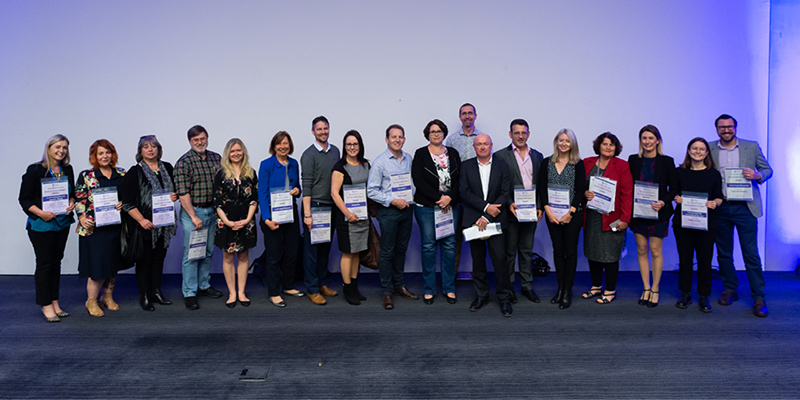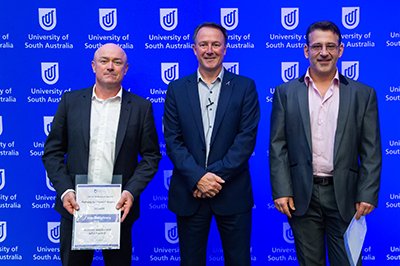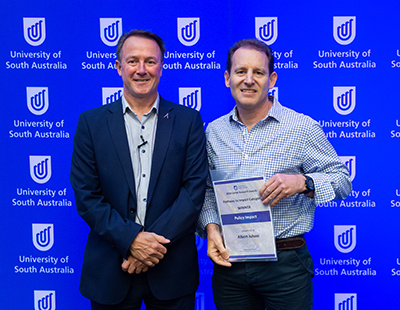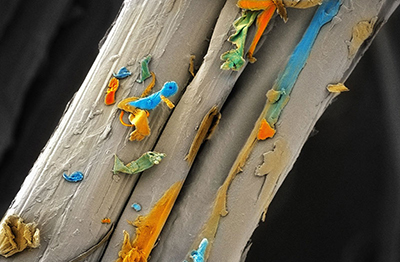The magic that happens when a nanoengineer and immunologist collaborate
By Adam Joyce
 INSIDE UNISA The 2019 Research Awards Winners
INSIDE UNISA The 2019 Research Awards WinnersWhat happens when a nanoengineer meets an immunologist?
In the case of two high-profile UniSA researchers, the result is the development of a new way to safely deliver vaccines without a painful needle, and hip and knee implants featuring an antibacterial surface – not to mention an incredible friendship.
 Professor John Hayball (left) and Professor Krasi Vasilev (right) won the UniSA Interdisciplinary Award for their research. They are pictured with Deputy Vice Chancellor for Research and Innovation Professor Simon Beecham at the UniSA Research Awards
Professor John Hayball (left) and Professor Krasi Vasilev (right) won the UniSA Interdisciplinary Award for their research. They are pictured with Deputy Vice Chancellor for Research and Innovation Professor Simon Beecham at the UniSA Research AwardsProfessor Krasi Vasilev, from UniSA’s School of Engineering, and Professor John Hayball, from UniSA’s School of Pharmacy and Medical Sciences, first joined forces a decade ago, successfully winning a National Health and Medical Research Council (NHMRC) grant.
Since then they have worked together on numerous projects while also improving their own projects by gaining from each other’s expertise and knowledge. The value of their partnership was recognised at the 2nd annual University-wide Research Awards, which were presented earlier this month. Profs Vasilev and Hayball won the Interdisciplinary Award, which recognises ground-breaking research that was only possible as a result of the integration of two or more unrelated disciplines.
“We both come from fundamental fields with great transformational potential – through the NHMRC grant we got a PhD candidate in each of our labs and it really set the stage for exploring new avenues together,” Prof Hayball says. “It was also the seed for a great friendship with has underpinned our collaboration.”
Prof Vasilev says both of their teams, including PhD candidates and research assistants, work closely together on several projects, including new ways to safely administer vaccines, and orthopaedic implants that protect patients from infection through a nanoscale antibacterial coating.
“After 10-plus years we are both on the cusp of human clinical trials resulting from our interdisciplinary approach which is making for better science and impacts on healthcare as well as being the foundation of a great friendship,” Prof Vasilev says.
The pair was among more than 20 UniSA researchers and staff whose incredible and innovative work was recognised and celebrated on UniSA Research Day.
 copy this Professor Albert Juhasz won the Policy Impact award at the UniSA Research Awards.
copy this Professor Albert Juhasz won the Policy Impact award at the UniSA Research Awards.Another researcher whose work was recognised through the awards was Associate Professor Albert Juhasz. Ingesting soil and dust is a significant way in which humans are exposed to environmental contaminants but Assoc Prof’s Juhasz’s work is reducing that risk.
Assoc Prof Juhasz and his team from the Future Industries Institute have developed a more accurate way to estimate exposure from lead, arsenic, cadmium and other hazardous materials found at contaminated sites. His work is now used Australia-wide through the National Environment Protection (Assessment of Site Contamination) Measure, which is used to assess contaminated sites.
The research allows a physiologically-based approach to be implemented at contaminated sites for exposure refinement, providing a greater understanding of contaminant exposure and risk, opportunities for cost-effective site remediation and a reduction in the amount of hazardous waste being sent to landfill. This has resulted in direct commercial benefits to industry.
He also helped develop guidance for the US Environmental Protection Agency to predict exposure from arsenic found in soil.
Assoc Prof Juhasz won the UniSA Policy Impact award for his work. The award recognises research that has been translated into changes in policy and that has led to significant real-world outcomes.
UniSA’s new Aboriginal Research Strategy was also launched at UniSA Research Day, which included a keynote speech by Uncle David Rathman, AM, PSM, FIML, and a smoking ceremony. Read more about the Aboriginal Research Strategy in the Vice Chancellor’s column.
The 2019 Research Awards Winners were:
 An image of a single cotton fibre with the natural wax impurities on the fibre wall, by Azadeh Nilghaz from the Future Industries Institute, won the People’s Choice Award in the 2019 Images of Research competition.
An image of a single cotton fibre with the natural wax impurities on the fibre wall, by Azadeh Nilghaz from the Future Industries Institute, won the People’s Choice Award in the 2019 Images of Research competition.- Early Career Researcher | Raymond Matthews
- Mid Career Researcher | Colin Hall
- Leadership in Research (Joint Winners) | Carol Kulik and Bruce Thomas
- Professional Support – Individual | Carly Rosewarne
- Professional Support – Team | Graduate Research Team – Jenni Critcher, Charlotte Ferrier, Claire Jackson
- Supervisor of the Year (Joint Winners) | Allison Cowin and Jennifer McKay
- Transformed PhD Student of the Year | Imogen Ramsey
- Ian Davey Research Thesis Prize | Tessa Bailey
- Interdisciplinary Award | Krasimir Vasilev and John Hayball
- Highest Ranked Research Themes Investment Scheme Application | Lifting Participation in Container Deposit Schemes: The Key to Waste Elimination in SA
- Partnership Award | Lia Bryant and Bridget Garnham
- Innovation Award | Automotive Commercialisation of Advanced Coating Systems (Colin Hall, Drew Evans, Bastian Stoehr)
- Policy Impact | Albert Juhasz
- Images of Research Competition People’s Choice Award | Fibre Based Microfluidics (Azadeh Nilghaz)
The full list of finalists is available on the UniSA website.
The winners will share in $55,000 of professional development funding.
For photos from the day, see In Pictures.
Other Stories
- UniSA researchers to help NASA monitor health in space
- Great career prospects for UniSA graduates, new government data shows
- Parents left in the cold when it comes to kids with autism
- New multilevel homes become heat traps in summer
- From the Vice Chancellor
- Achievements and Announcements
- World first study with drone cameras able to identify survivors
- Wastewater study pinpoints cities across the world with high drug use
- UniSA ranked top in SA for Education, Law, Business and Economics
- Opportunity for almost 200 UniSA students to study in Indo-Pacific in 2020
- Intensive course empowers women impacted by domestic violence and homelessness
- The magic that happens when a nanoengineer and immunologist collaborate
- UniSA takes reins on world first Invictus Pathways Program for Aussie veterans and first responders
- New Social Enterprise Hub to foster social innovation and entrepreneurship
- New partnership with MIT to underpin data visualisation research
- UniSA Vietnamese law student wins SA’s top honour
- The latest books from UniSA researchers
- UniSA Alumni Awards and UniSA Research Day
- Australia’s drought relief package hits the political spot but misses the bigger point
- Relive the Hawke Centre’s latest events
- Read the latest edition of unisabusiness magazine
- Read the latest edition of enterprise magazine




